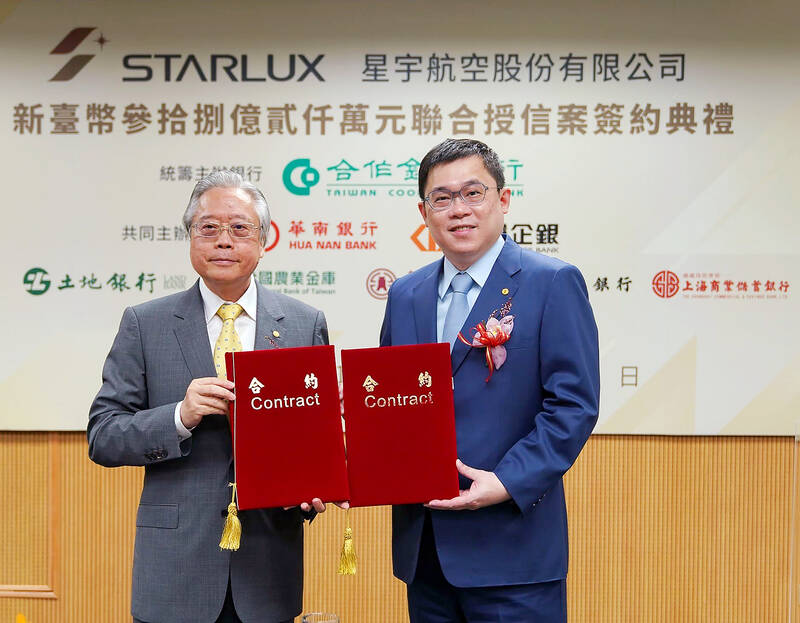Starlux Airlines Co (星宇航空) has reached a NT$3.82 billion (US$123.7 million) syndicated loan agreement with 10 local banks to fund the purchase of Airbus 350-900 passenger jets, which would be used on Asian and US routes, the airline said yesterday.
The syndicated loan was 52 percent oversubscribed by the banks led by Taiwan Cooperative Bank (合庫銀行), the airline said.
The other banks are Hua Nan Commercial Bank (華南銀行), Taiwan Business Bank (台灣企銀), First Commercial Bank (第一銀行), Land Bank of Taiwan (土地銀行), Agricultural Bank of Taiwan (農業金庫), Bank of Taiwan (臺灣銀行), Chang Hwa Commercial Bank (彰化銀行), Shanghai Commercial and Savings Bank (上海商業儲蓄銀行), and Bank of Kaohsiung (高雄銀行).

Photo courtesy of StarLux Airlines Co
Despite the negative effects of the COVID-19 pandemic, Starlux under the direction of chairman Chang Kuo-wei (張國煒) has secured the lenders’ support, Taiwan Cooperative Bank said in a statement.
It was the first syndicated loan for Starlux, after the airline conducted five capital injections to boost its paid-in capital to NT$18.11 billion since its establishment in 2018.
The airline plans to use the loan to purchase 18 Airbus 350-900 XWB jets, the first of which is to arrive next month, it said.
The wide-body jets would enter service on the carrier’s Asian routes in the first quarter of next year and start flying on its Taiwan-Los Angeles route from April next year, it said.
The airline would also take delivery of four Airbus 321neo jets and one Airbus 330neo aircraft by the end of this year, boosting its fleet size to 19, it added.
Chang said the airline would use the Airbus 350-900 jets on long-haul flights and expects services to North America to boost its international presence.
Starlux said that revenue in the first eight months of this year grew 130 percent year-on-year to NT$1.1 billion.
During the same period, passenger revenue rose 173 percent annually and cargo revenue rose 107 percent annually, it said.
The airline posted a net loss of NT$2.66 billion in the first half of this year, with accumulated losses reaching NT$9.59 billion since its establishment.

SEEKING CLARITY: Washington should not adopt measures that create uncertainties for ‘existing semiconductor investments,’ TSMC said referring to its US$165 billion in the US Taiwan Semiconductor Manufacturing Co (TSMC, 台積電) told the US that any future tariffs on Taiwanese semiconductors could reduce demand for chips and derail its pledge to increase its investment in Arizona. “New import restrictions could jeopardize current US leadership in the competitive technology industry and create uncertainties for many committed semiconductor capital projects in the US, including TSMC Arizona’s significant investment plan in Phoenix,” the chipmaker wrote in a letter to the US Department of Commerce. TSMC issued the warning in response to a solicitation for comments by the department on a possible tariff on semiconductor imports by US President Donald Trump’s

The government has launched a three-pronged strategy to attract local and international talent, aiming to position Taiwan as a new global hub following Nvidia Corp’s announcement that it has chosen Taipei as the site of its Taiwan headquarters. Nvidia cofounder and CEO Jensen Huang (黃仁勳) on Monday last week announced during his keynote speech at the Computex trade show in Taipei that the Nvidia Constellation, the company’s planned Taiwan headquarters, would be located in the Beitou-Shilin Technology Park (北投士林科技園區) in Taipei. Huang’s decision to establish a base in Taiwan is “primarily due to Taiwan’s talent pool and its strength in the semiconductor

An earnings report from semiconductor giant and artificial intelligence (AI) bellwether Nvidia Corp takes center stage for Wall Street this week, as stocks hit a speed bump of worries over US federal deficits driving up Treasury yields. US equities pulled back last week after a torrid rally, as investors turned their attention to tax and spending legislation poised to swell the US government’s US$36 trillion in debt. Long-dated US Treasury yields rose amid the fiscal worries, with the 30-year yield topping 5 percent and hitting its highest level since late 2023. Stocks were dealt another blow on Friday when US President Donald

UNCERTAINTY: Investors remain worried that trade negotiations with Washington could go poorly, given Trump’s inconsistency on tariffs in his second term, experts said The consumer confidence index this month fell for a ninth consecutive month to its lowest level in 13 months, as global trade uncertainties and tariff risks cloud Taiwan’s economic outlook, a survey released yesterday by National Central University found. The biggest decline came from the timing for stock investments, which plunged 11.82 points to 26.82, underscoring bleak investor confidence, it said. “Although the TAIEX reclaimed the 21,000-point mark after the US and China agreed to bury the hatchet for 90 days, investors remain worried that the situation would turn sour later,” said Dachrahn Wu (吳大任), director of the university’s Research Center for